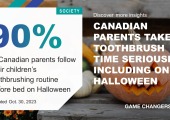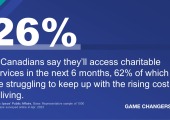Canadians' Views on Deficit Reduction
Should "Extra Money" Mean Increased Spending or Tax Cuts?
In the wake of the federal Liberal government's recent announcement that it is surpassing its original deficit reduction targets, most Canadians would prefer to see any extra money put towards social programs or job creation, rather than towards further reducing the deficit or, especially, a tax cut for all Canadians. In fact, presented with a scenario whereby the federal government meets its deficit targets but decides not to go beyond them, the Canadian public -- by a margin of fully three to one -- opts for seeing any extra money spent on social programs or job creation rather than being used for a tax cut.
These findings emerged from a National Angus Reid/Southam News Poll conducted among a representative cross-section of 1502 Canadians between October 22nd and 28th, 1996.
Canadians' Views on Selected Options Associated With Being Ahead of Deficit Reduction Targets
After apprising surveyed Canadians that the federal government is ahead of its original deficit reduction targets, this late-October National Angus Reid Poll assessed public opinion on four different approaches the federal government could potentially take in light of this situation. Each of the four options -- presented on its own and predicated on deficit reduction targets being achieved -- met with overall support from the public: (Table 1)
- Meeting the original deficit target and putting any extra money towards health care and education
- Fully 85 percent of surveyed Canadians said they would support the federal government taking this approach, compared to only 14 percent who voiced opposition. A large majority of respondents from all major regions and other population segments were supportive of this option.
- Meeting the original deficit target and putting any extra money towards job creation Almost as many (82%) opted for putting "extra money" towards jobs (17% opposed this). Again, large majority support was expressed by surveyed Canadians from all walks of life, with enthusiasm for this option becoming more pronounced as one moves eastward across the country.
- Staying ahead of their original deficit target and putting any extra money towards further reducing the deficit
- Three in four (75%) surveyed Canadians said they would support the federal government exceeding the deficit targets by assigning "extra money" to further reductions in the deficit; one in four (23%) said they would be opposed. Support for this option is fairly consistent across major population sub-groupings, with the exception of somewhat more muted enthusiasm among Atlantic Canadians (61%). Meeting the original deficit target and putting any extra money towards a tax cut for all Canadians
- Of the four approaches assessed, earmarking any "extra money" towards a tax cut received the lowest level of public support: 60 percent, versus 38 percent who voiced their opposition.
- In addition, public support varies to the greatest degree for this option, peaking among Quebecers (75%) and dropping to one-half of Ontario residents (48%) and higher income Canadians (50%).
The Public's Overall Preferred Option
When asked which of these four options they would most prefer in light of the federal government being ahead of its original deficit reduction targets, consistent with the above item-by-item assessment, a plurality of more than one in three (36%) surveyed Canadians opted for putting any extra money towards health care and education, and almost as many (32%) said they would like to see the federal government put the "extra money" into job creation. Putting the "extra money" towards the deficit was less popular (23%). Only one in ten (9%) opted for using the "extra money" towards a tax cut. (Table 1)
The public's overall preferences on this front vary significantly across regional lines. Applying any "extra money" towards health care and education was the most favoured approach among a plurality of at least four in ten surveyed residents of Alberta (45%), Manitoba/Saskatchewan (42%), Ontario (41%) and Atlantic Canada (46%). Meanwhile, one-half (49%) of Quebecers opted instead for putting any extra money towards job creation, while British Columbians' preference tipped in favour (rather narrowly) of applying any extra money towards the deficit (34%). The proportion opting for a tax cut varies from 5 percent in the Atlantic region to 13 percent in Manitoba/Saskatchewan. (Table 1a; Table 1b)
Canadians participating in this National Angus Reid Poll were then asked which of two broad options they would prefer if the federal government meets its deficit targets and decides not to put any extra money towards deficit reduction beyond those targets. Fully three-quarters (75%) said they believe "any extra money should be spent for job creation or social programs like health care and education", three times the number (23%) who said "any extra money should be put back into the pockets of Canadians through a tax cut". (Table 2) Applying any extra money towards social spending rather than a tax cut was favoured by at least a two-to-one margin among all major sub-groups of the Canadian population, with the narrowest margin recorded among British Columbians (still 64% versus 32%). (Table 2a; Table 2b)
This National Angus Reid/Southam News Poll was conducted by telephone between October 22nd and 28th, 1996 among a representative cross-section of 1502 Canadian adults.
The actual number of completed interviews in each region was as follows: B.C. -- 200; Alberta -- 135; Manitoba/Saskatchewan -- 121; Ontario -- 526; Quebec -- 400; Atlantic -- 120. These data were statistically weighted to ensure the sample's regional and age/sex composition reflects that of the actual Canadian population according to the 1991 Census data.
With a national sample of 1502, one can say with 95 percent certainty that the results are within 1772.5 percentage points of what they would have been had the entire adult Canadian population been polled. The margin of error will be larger within regions and for other sub-groupings of the survey population.
For further information, contact:
Darrell Bricker
Senior Vice President
Angus Reid Group
(613) 241-5802
John Wright
Senior Vice-President
Angus Reid Group
(416) 324-2900
More insights about Consumer Goods


![[WEBINAR] KEYS: Global Trends - The Uneasy Decade](/sites/default/files/styles/related_more_insights/public/ct/event/2025-09/thumbnail-templates_0.png?itok=Qh37M2xL)
![[WEBINAR] Canadian EV Adoption Trends in 2025](/sites/default/files/styles/related_more_insights/public/ct/event/2025-01/thumb.png?itok=RSGzZvMm)
![[WEBINAR] Sustainable Packaging: A Potential Avenue of Distinction](/sites/default/files/styles/related_more_insights/public/ct/event/2023-09/SustainablePackaging_WebR_feature%20copy.jpg?itok=X0DpNf_C)